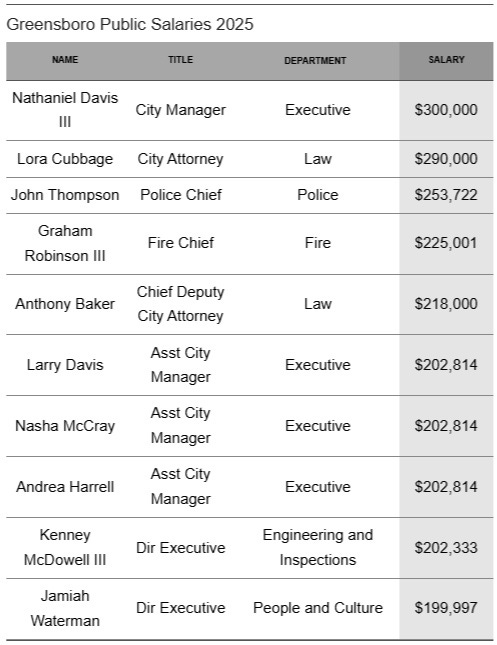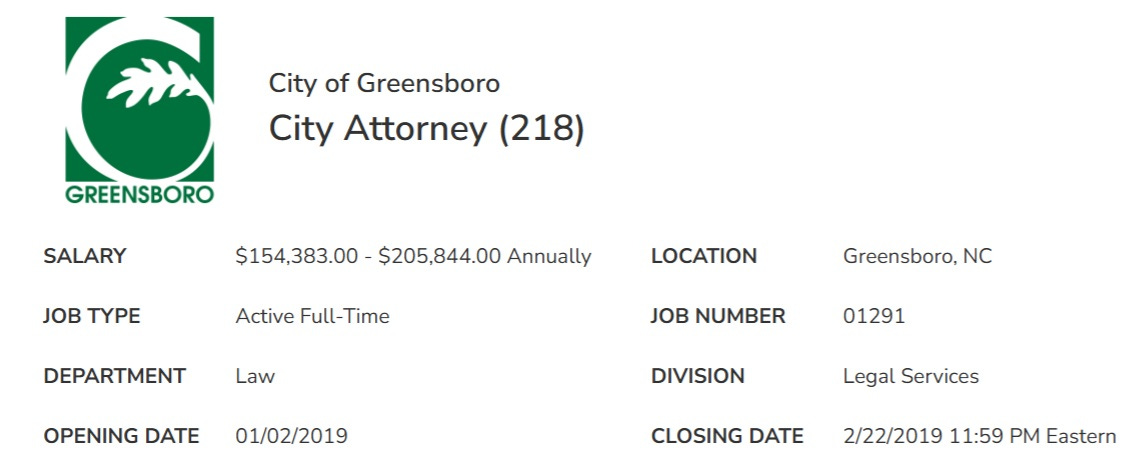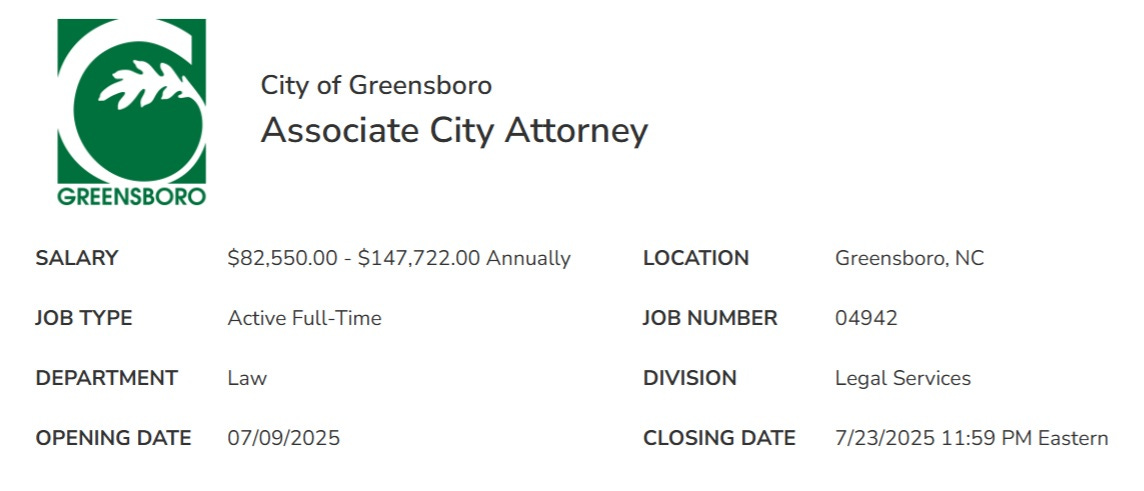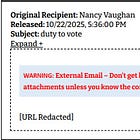Questions Mount Over Greensboro’s $290,000 City Attorney Hire
A former judge with very little to no municipal law experience was promoted to lead the city’s legal department after just four months on the job
Greensboro residents are raising red flags over a City Attorney appointment that appears to have bypassed the city’s normal hiring standards. At the center of the controversy is former Superior Court Judge Lora Cubbage, who was promoted to lead the City’s legal department just four months after being hired despite limited experience in municipal law.
Public Integrity Watch received an anonymous letter from concerned Greensboro citizens raising serious questions about the qualifications and appointment process.
The physical correspondence no longer exists, having been shredded and incinerated. However, contents of the letter were provided to Greensboro’s legal department, city management and City Council members for comment. None of whom have responded.
When Lora Cubbage stepped down from the North Carolina Superior Court bench in early 2025, she brought an impressive resume: assistant district attorney, assistant attorney general and judicial experience at both the district and superior court levels. What she didn’t bring was a background in municipal law.
The Suspicious Timeline
According to the letter, the circumstances surrounding Cubbage’s hiring warrant scrutiny;
March/April 2025; Cubbage is hired as Deputy City Attorney. No public job posting or competitive hiring process appears to have occurred. No comment from the city etc...
April 2, 2025, Cubbage acknowledged her inexperience; “Joining the Greensboro City Attorney’s Office affords me an opportunity to learn a whole new area of law.”
July 2025; After working at the city for approximately four months, Cubbage is unanimously appointed City Attorney by the City Council and Mayor with a salary of approximately $290,000.
The City of Greensboro City Attorney job posting from 2019 has a salary range of $154,383.00 - $205,844.00 Annually;
No Record of Competitive Hiring Process
No searches indicate the City of Greensboro posted or advertised a vacancy for the City Attorney position prior to Lora Cubbage’s initial hiring, nor for the City Attorney position before her July 8 appointment. The City’s career archives, press releases and council agendas show no evidence of a competitive recruitment process for either role. The only relevant listings that appear afterward are a July 10, 2025 posting for an Associate City Attorney, apparently to replace Cubbage’s former position, and an August 15, 2025 posting for Deputy City Attorney, which followed Deputy Attorney Tony Baker’s resignation. Together, these records suggest that no public or competitive hiring process occurred before Cubbage’s rapid promotion to lead the legal department.
The letter’s authors note “no due diligence was performed, she wasn’t appointed as interim, no nationwide search. Nothing was done in line with standard municipal practice when hiring an executive, especially someone with no experience for the role.”
This stands in stark contrast to typical executive-level municipal hiring, which often involves executive search firms, nationwide candidate searches, background checks, reference checks, extensive interviews and deliberative selection processes.
In February, 2024, When running North Carolina’s Supreme Court, Cubbage told The Daily Tar Heel “I’m the only candidate that has judicial experience in the trial courts. I’m the only candidate that’s ever presided over a case.”
This response, however, sidesteps the central question; Does trial court experience substitute for municipal law expertise?
The two practice areas are fundamentally different. Judges adjudicate disputes between parties in an adversarial setting. Municipal attorneys provide ongoing advisory counsel, draft ordinances, review contracts, manage outside counsel, ensure regulatory compliance, and guide city officials through complex policy decisions. They rarely see the inside of a courtroom.
Mayor Nancy Vaughan defended the appointment, stating that Cubbage “exhibits the leadership skills required to manage the City Attorney’s Office.” The anonymous letter challenges this assertion: “What leadership skills and based on what experience exactly? There appears to be none.”
ZipRecruiter asks “What qualifications and skills are important for legal professionals working in municipal government?” and answers with “Legal professionals in municipal government should have... Knowledge of local government law, administrative procedures, and regulatory compliance is essential. Strong analytical, negotiation, and communication skills are important for advising officials and drafting legislation. Experience in public policy and community engagement can enhance effectiveness.”
Now, concerned citizens and former city employees are asking; How did someone with essentially very little to no municipal law experience rise so quickly to lead the legal department of North Carolina’s third-largest city?
The Qualification Gap
The issue isn’t whether Cubbage is competent or accomplished. It’s whether Greensboro’s citizens can trust that senior city roles are filled through transparent, merit-based processes rather than political reciprocity.
The concerns begin with Greensboro’s own hiring standards. A job posting published the day after Cubbage’s promotion to City Attorney requires “four to six years of experience practicing in municipal law or equivalent legal experience.”
Applicants must demonstrate experience in:
Administrative, Constitutional, and Municipal law
Public Records Laws
Policy review and writing
Litigation in both state and federal courts
Public contracts and procurement
If these are the minimum qualifications for an associate-level position, the question becomes unavoidable; What qualifications did the City require for the person leading the entire department?
Standard practice for cities of Greensboro’s size (population approximately 310,000) typically requires at least ten years of legal experience with at least five years specifically in municipal law practice. Municipal law is a specialized field encompassing public contracts, procurement, land use, tax law, public records compliance, elections law, and providing advisory services to city officials, fundamentally different work than criminal prosecution or presiding over a courtroom.
Learning on the job may be acceptable for entry-level positions. For the city’s top legal officer earning nearly $300,000 annually, it raises troubling questions about the vetting process.
The Chuck Watts Connection
The letter suggests that Cubbage’s arrival at the City Attorney’s Office coincided with growing scrutiny of then–City Attorney Chuck Watts. It alleges she may have been aware of his outside business ventures, issues that later contributed to his departure.
A legal complaint from former city employee Shannon Stevens allegedly states that Cubbage was aware of Watts’ outside dealings prior to starting at the City of Greensboro. The letter poses a direct question: “What deal did Lora Cubbage make with Chuck Watts to leave the bench?”
Watts ultimately retired amid controversy. His deputy, Tony Baker, was also allowed to resign. But two long-serving female employees, Jennifer Smith-Sutphin and Shannon Stevens, were terminated by Cubbage shortly after she became City Attorney.
According to the letter, these employees’ “only downfall was following the directions of their supervisor, a superior; the then City Attorney, Chuck Watts.”
A Web of Political Connections
Perhaps most concerning are the political and financial ties between Cubbage and the officials who appointed her. Campaign finance records show that during her judicial campaigns, Cubbage received contributions from;
City Council Members;
Mayor Nancy Vaughan, Hugh Holston, Jamilla Pinder, Tammi Thurm, Marikay Abuzuaiter, Nancy Hoffmann and Goldie Wells.
City Legal Department;
Chuck Watts (then-City Attorney), Andrea Harrell (city attorney and now Assistant City Manager) and Rosetta Davis (city attorney). Davis is now listed as Deputy City Attorney. https://www.greensboro-nc.gov/departments/city-attorney-s-office
This creates what the letter describes as “a deeply entrenched network of political and financial allegiances” that “has rendered the city’s internal ethics process incapable of impartial adjudication.”
The concern is straightforward; How can a City Attorney provide objective, unbiased legal counsel to officials who financially supported her political campaigns? When the same individuals who funded her judicial elections now rely on her legal advice, and in some cases, ethical guidance, the independence required for proper legal oversight is compromised.
Adding to these concerns, Cubbage recently promoted Rosetta Davis, a “huge contributor to Cubbage’s former campaigns” according to the letter, to Deputy City Attorney. Davis is also responsible for handling public records requests, and the letter alleges she improperly handled records related to employee terminations “in an attempt to shield her boss and long-time friend and mentor Lora Cubbage from public scrutiny.”
The Governor’s Seal of Approval
Cubbage’s political connections extend to the highest levels of North Carolina government. She was appointed to superior court judge by Governor Roy Cooper in 2018. In April 2025, Governor Josh Stein honored her with The Order of the Longleaf Pine, the state’s highest civilian award.
These accolades demonstrate her standing within North Carolina’s Democratic political establishment. But they don’t address whether she possesses the specialized expertise required to serve as City Attorney for a city of 310,000 residents.
What the Public Deserves
The unnamed letter concludes with a simple request: “All we ask as citizens, is that due diligence is performed to ensure the right candidate is selected for the role, not the most popular, well known or the one you can use to justify what you want to do as a council member.”
This isn’t about Lora Cubbage’s character or her accomplishments as a judge. It’s about whether Greensboro’s citizens are receiving the legal expertise they’re paying for, and whether the hiring process was conducted with appropriate transparency and rigor.
Key questions remain unanswered;
What vetting process, if any, was conducted before her appointment as City Attorney?
Were other candidates considered, or was this a pre-determined outcome?
How can the City Attorney provide independent legal counsel to officials who funded her political campaigns?
Did the City Council consider candidates with actual municipal law experience?
What role, if any, did knowledge of Chuck Watts’ outside employment issues play in her hiring?
Public Integrity Watch has submitted comprehensive public records requests seeking documentation of the hiring process, job postings, applications, vetting materials and communications between city officials regarding Cubbage’s appointment.
A Pattern Worth Watching
The combination of factors here; the lack of relevant experience, the abbreviated timeline, the absence of a competitive search, the web of political contributions and the synchronicity with the previous City Attorney’s departure creates a pattern demanding transparency.
The letter writers note that Cubbage’s “political aptitude and connections in Raleigh are undeniable and are certainly useful to support the City’s lobbying efforts.” They’re not wrong. But they add a crucial qualifier; “Greensboro doesn’t need a popular judge and political machine as City Attorney, who has bought her way into a position, but someone who has the experience for the role and is qualified for the position.”
As newly elected City Council members take their seats, the letter’s final warning resonates; “We can only hope the newly elected City Council members aren’t beholden to the City Attorney through favors and donations.”
In a functioning democracy, the public has the right to expect that critical government positions are filled based on qualifications and through transparent processes, not political connections and campaign contributions.
The public is left to wonder whether Greensboro’s legal department is being led by merit, or by politics.
The citizens of Greensboro deserve answers.
Readers with relevant documentation or firsthand knowledge are encouraged to contact Public Integrity Watch in confidence.
Update; From the City’s answer to Public Records Request #32482;
We do not have any classification or evaluation documentation to share. The description has not been updated since 2012. I have attached the posting for 2019 which was managed by Developmental Associates. This is when we hired Chuck Watts. The Council appointed our current City Attorney.
This is the requisition information for the 2019 posting for the City Attorney for which Chuck Watts was hired. There was no advertisement for 2025, which Lora Cubbage was hired, she was appointed by the City Council.
The Deputy City Attorney was not competitive either. She was recruited and hired by Chuck Watts.”
Related;
Disclaimer
This article is based on information obtained from public records, official statements, campaign finance reports and documents provided to Public Integrity Watch. Certain details are drawn from an anonymous letter whose authenticity has been independently verified to the extent possible. All individuals and entities named are afforded the presumption of innocence, and any allegations discussed remain unproven unless confirmed by official findings or documentation.
Readers are encouraged to review the cited sources and to submit corrections or additional evidence if any factual inaccuracies are identified.






